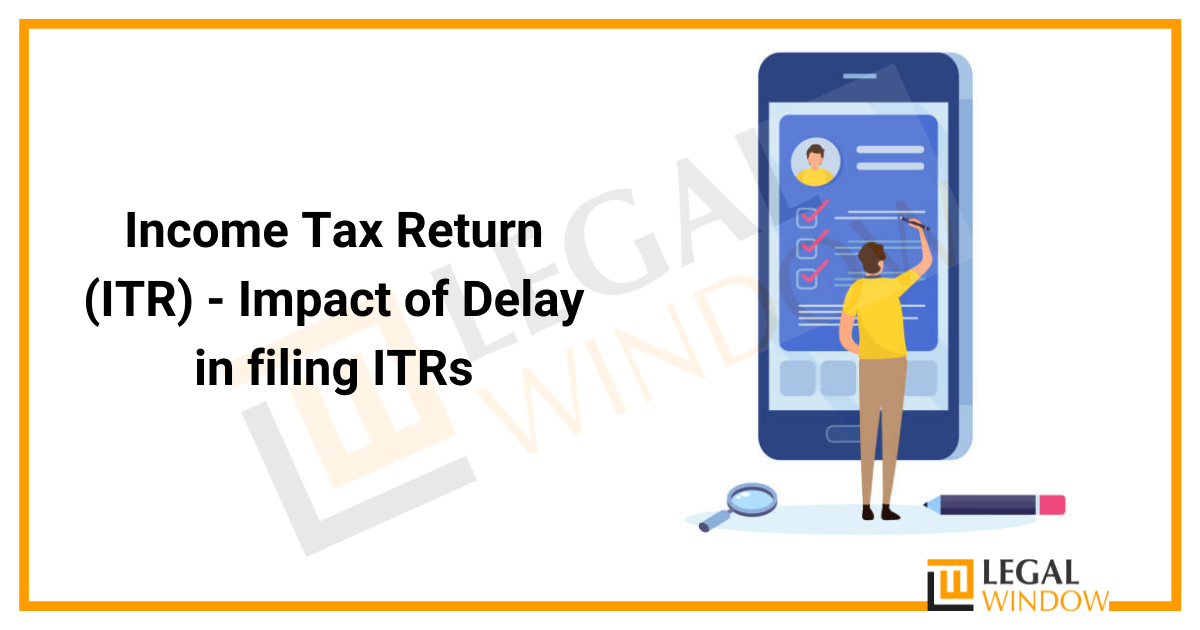
The Government of India has established Income Tax laws governing the taxable income of all individuals who are individuals, HUFs, Companies, Firms, LLP, People’s Organizations, and any other legal person. Everyone eligible to become a citizen of India is required to pay tax on the income taxable. Every financial year, taxpayers are required to file the Income Tax Returns (ITR) in compliance with the prescribed rules and regulations. Let us discuss theimpact of delay in filing Income Tax Return (ITR).
| Table of contents |
ITR Form
Income Tax Return is a form used to enter your income and tax details into the Revenue Department. The taxpayer’s tax liability is calculated based on the amount earned. According to the tax laws imposed on India, you are required to file an ITR if your income exceeds the basic exemption limit. The income tax rate is pre-determined for taxpayers and any delays in completing repayments will attract late payment of late payment fees.
Impact of delay in filing Income Tax Return (ITR)
The provisions of Section 234F Income Tax, which was introduced on 1 April 2017, shall apply if:
- If the assessee has not filed the ITR under the provisions of Section 139
- If the assessee delays the filing of the ITR on or before the due date
Section 234F applies to all categories of persons. The provisions are applicable on AOP,Individuals, BOI, HUF, Firms, LLP,Companies, etc. in case the ITR is filed after due dates. The department introduced late payments to ensure timely refunds.
The amount payable as per Section 234F of the Income Tax Act, 1961:
Total income of the assessee is greater than INR 5 Lakhs
- > INR 5000 – ITR filed on or before 31 December
- > INR 10,000 – ITR filed after 31 December
Total income is less than INR 5 Lakhs
- > Maximum fee is INR 1000
Apart from the fine charged by the IT Department, there are some other consequences that a taxpayer might face by filing late returns:
- Unable to set off loss: Losses that occur (other than losses of property) are not permitted to continue in subsequent years. You cannot reverse this loss compared to future gains if the return is not filed within the deadline. However, if there is a loss under the house property, losses to carry forward are allowed.
- Interest rate to apply on delay in filing return: Except for late fees expenses, the interest as per section 234A of the Act of about 1% per month or part thereof will be charged till the date of charge of taxes.The ITR can’t be filed unless taxes are paid. Interest calculations will start from the date immediately falling after the deadline i.e. 31 August 2019 in AY 2019-20. So, you have to pay according to the delay.
- Delayed Refunds: If you are entitled to a refund from the government for excess taxes paid, you must complete the refund before the due date to receive your refund promptly.In addition to the late payment, the assessee also faces the following consequences due to delay in ITR filing:
- Exemptions under section 10A, section 10B for new institutions are not available
- Withdrawals under 80-IA, 80-IAB, 80-IB, 80-IC, 80-ID, and 80-IE, in terms of profits from industrial activities or businesses involved in infrastructure development, are not available
- Deductions under 80JJAA, 80LA, 80P, 80PA, 80IAC, 80IBA, 80QQB 80JJA, and 80RRB are not available
Benefits of filing ITR timely
With the timely filing of ITRs, Assessee can receive the following benefits:
- Easy Loan Permits- Filing the ITR will help individuals when they have to apply for a car loan, House Loan, etc.
- Seek Tax Refund- If you have a refund due from the Tax Department, you must submit your Income Tax Return on time to get the refund as soon as possible
- Quick Visa Processing- Most embassies and consulates require you to submit copies of your tax returns for the past few years at the time of applying for a visa.
- To carry forward losses- If you file a tax return within the due date, you will be able to continue the loss for years to come.
- Avoid Penalty and Prosecution- The tax officer can start prosecution proceedings for a period of 3 months to 2 years and with a fine if you do not file your ITR.

Final words
Income tax return filing on or before the due date is a very important task for any taxpayer. Late filing of income tax takes many benefits for the taxpayer. Except for minor exemptions, the taxpayer will also have to pay a fine. Taxpayers should avoid the practice of filling out late payments.
Late filing fees under section 234F are subject to return filed from AY 2018-19 onwards. If the refund is filed after the due date but no later than 31 December of the year of assessment, late payment of ₹ 5,000 is charged. If the return is filed after 31 December, late payment of Rs 10, 000 is payable. However, the late payment amount may not exceed Rs1, 000, if the total income does not exceed Rs5 lakh. The article enumerates the impact of delay in filing Income Tax Return (ITR).
CA Pulkit Goyal, is a fellow member of the Institute of Chartered Accountants of India (ICAI) having 10 years of experience in the profession of Chartered Accountancy and thorough understanding of the corporate as well as non-corporate entities taxation system. His core area of practice is foreign company taxation which has given him an edge in analytical thinking & executing assignments with a unique perspective. He has worked as a consultant with professionally managed corporates. He has experience of writing in different areas and keep at pace with the latest changes and analyze the different implications of various provisions of the act.
Categories
- Agreement Drafting (23)
- Annual Compliance (11)
- Change in Business (36)
- Company Law (147)
- Compliance (88)
- Digital Banking (3)
- Drug License (3)
- FEMA (17)
- Finance Company (42)
- Foreign Taxation (6)
- FSSAI License/Registration (14)
- GST (117)
- Hallmark Registration (1)
- Income Tax (199)
- Latest News (34)
- Miscellaneous (164)
- NBFC Registration (8)
- NGO (14)
- SEBI Registration (6)
- Section 8 Company (7)
- Start and manage a business (20)
- Startup/ Registration (126)
- Trademark Registration/IPR (40)
Recent Posts
- Understanding the provisions of GST Audit and Adjudication April 20, 2024
- April, 2024 Tax Compliance Tracker: Income Tax & GST Deadlines April 18, 2024
- Managing Director & Whole Time Director in a Private Limited Company April 17, 2024
About us
LegalWindow.in is a professional technology driven platform of multidisciplined experts like CA/CS/Lawyers spanning with an aim to provide concrete solution to individuals, start-ups and other business organisation by maximising their growth at an affordable cost.







